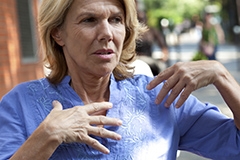Arrhythmia, When Your Heart Starts Racing And Exceeds the Speed Limit
Medically Reviewed by Prabal K. Guha, MD
A shortness of breath. Rapid pulse. Light-headedness. Dizziness.
It could be love!
Yes, but it might also be symptoms of arrhythmia — a condition, where electrical signals in the heart are misfiring.
“When the electrical signals in the heart misfire, the rapid heartbeat – up to 250 beats per minute — doesn’t give the heart enough time to fill before it contracts,” says McLeod Electrophysiologist Prabal Guha MD. “As a result, blood flow to other parts of the body is insufficient, leading to the light-headed feeling, dizziness and, possibly, fainting.”
One type of this revving of the heart is the body’s normal response to anxiety, emotional distress or strenuous exercise. The beat is fast, but steady. And it quickly slows to a normal rate.
When abnormal electrical signals originate in either the upper (atrial) or lower (ventricular) part of the heart, results can be more serious. The episodes can last only a few seconds or minutes. Or they can stretch to hours or days. They may only happen once or twice a year. Or several times a day, a person finds their heart unexplainably racing.
WHAT SPARKS ARRHYTHMIAS?
Susceptible individuals may find the condition triggered by too much caffeine, alcohol or cigarettes. Other triggers involve extreme fatigue or emotion. Arrhythmias may appear as a complication following a heart attack or as a side effect when taking medication to control a heart arrhythmia, such as atrial fibrillation.
Cardiologists diagnose the problem with an in-office Electrocardiogram (ECG). If the “episodes” happen erratically, the cardiologist may fit the patient with a portable device to record the heart throughout the day. Occasionally, an Electrophysiologist will conduct a diagnostic procedure, threading a wire into the patient’s heart and recording the electrical pulses.
TREATMENTS
Treating arrhythmias takes two forms.
- Stopping an episode in progress.
- Valsalva is a fancy name for holding your nose and mouth shut while you try to breath, exerting pressure on your chest. It can break the rhythm of the out of control heartbeat.
- Medication can be injected in an ER to block the abnormal electrical pulses, although this may result in minor to serious side effects.
- In severe cases, a defibrillator might be required to shock the heart back into a slower, steady rhythm.
- Preventing future episodes.
- Start by reducing your intake of caffeine, alcohol and cigarettes.
- Daily medication slows down the electrical impulses. However, side effects include dizziness, diarrhea and blurred vision.
- Implantable Cardiac Defibrillators (ICDs), which look like a pacemaker and is placed in the patient’s chest. If the ICD senses an arrhythmia episode, it shocks the heart back into rhythm.
Catheter Ablation offers a solution for patients troubled by ongoing, repeated episodes. In this outpatient procedure, an Electrophysiologist threads a wire into the heart – much like the diagnostic procedure. Once the specialists pinpoint the problem area, radio waves at the tip of the catheter destroy the problem site.
ACTION YOU CAN TAKE
Reduce your exposure to those situations or substances that trigger arrhythmia. If that doesn’t help, see a Cardiologist or Electrophysiologist for a full diagnosis and possible treatment.
Sources include: McLeod Health, American Heart Association, National Health Service (UK), Current Problems in Cardiology, New England Journal of Medicine
-
McLEOD REGIONAL MEDICAL CENTER FLORENCE
843-777-2000 -
McLEOD DARLINGTON
843-777-1100 -
McLEOD DILLON
843-774-4111 -
McLEOD LORIS
843-716-7000 -
McLEOD SEACOAST
843-390-8100 -
McLEOD CHERAW
843-537-7881 -
McLEOD CLARENDON
803-433-3000



-
McLEOD REGIONAL MEDICAL CENTER FLORENCE
843-777-2000 -
McLEOD DARLINGTON
843-777-1100 -
McLEOD DILLON
843-774-4111 -
McLEOD LORIS
843-716-7000 -
McLEOD SEACOAST
843-390-8100 -
McLEOD CHERAW
843-537-7881 -
McLEOD CLARENDON
803-433-3000
 Find a Doctor
Find a Doctor  Locations
Locations  Services
Services 